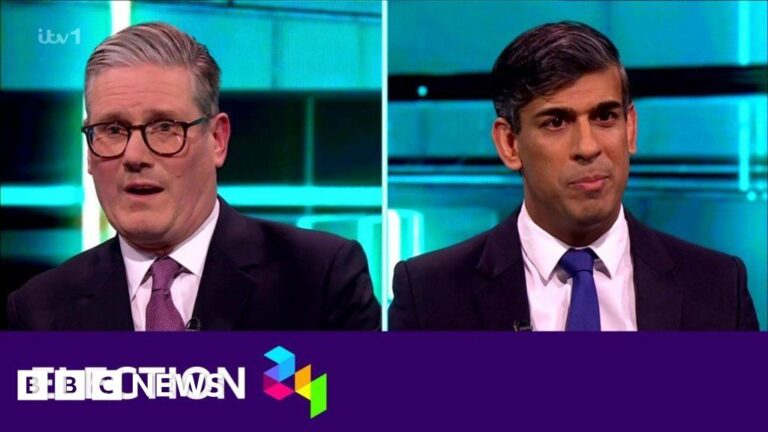Rishi Sunak and Sir Keir Starmer faced off in the first televised debate of the general election, trading fierce words over tax, the NHS and immigration.
The Conservative and Labour leaders argued at times, forcing the host of the ITV event to intervene and urge both parties to “keep their voices down”.
Mr Sunak said Labour wanted a £2,000 tax increase, but Mr Starmer dismissed this as “complete nonsense”.
And both leaders took the opportunity to tell voters how their childhood experiences shaped their political views.
For many analysts, Sunak needed to deliver a big result after a volatile week that saw his party’s approval ratings drop to dismal lows and Reform UK Party leader Nigel Farage return to the political frontline.
He started on a strong note, slamming Starmer over his tax policy and frequently ignoring his rival, the committee chair, Julie Etchingham.
The topic of the debate was determined by questions from the audience, and the first question came from Paula from Huddersfield.
Mr Sunak insisted plans to grow the economy were starting to have an effect and said Labour would fund its spending plans with a “£2,000 tax increase on every working family in the country”.
“Labour will raise taxes. It’s in their DNA. Labour will tax your job, your car, your pension,” Mr Sunak said.
The Conservatives came up with the figure by dividing the cost of Labour’s spending pledges by the number of UK households with at least one member in work.
Mr Sunak suggested the costs were calculated by an impartial civil servant but they were based on estimates by politically appointed special advisers.
One of the most substantive policy points of the evening was when Rishi Sunak appeared to suggest he was prepared to withdraw the UK from the European Convention on Human Rights (ECHR) if the Rwanda policy did not work out.
Sunak said he believed the UK’s plans “comply with our international obligations” but added: “If I had to choose between the security of our borders and the security of our country or a foreign court, I would always choose the security of our country.”
The Labour leader hit back, saying the UK would “not walk away from international agreements and international law which are respected around the world”.
He said he wanted Britain to become “a respected player on the world stage, not a pariah”.
Starmer argued his opponents were out of touch with reality and lived in “another world”.
Starmer has consistently attempted to contrast his own career with that of the Prime Minister, speaking of the “torment” of having his phone cut off as a child for unpaid bills.
This is something the Prime Minister has never experienced, he suggested.
The clearest differences of opinion emerged among leaders when they were asked the yes-or-no question: “If your loved one was on a long waiting list for surgery and you felt that was the only way forward, would you use private healthcare?”
Mr Sunak said “yes” and Mr Starmer said “no”. The Labour leader said the NHS was in his DNA.
At various points in the debate, both men were keen to highlight the role of the British health service in their careers.
The son of a GP and a pharmacist, Rishi Sunak’s story will be familiar to many, but he was hoping to reach a new audience through the debate.
Similarly, Mr Starmer spoke about his wife and mother working in the NHS.
He also talked about how his father was a toolmaker and the first in his family to attend college.
Both Mr Sunak and Mr Starmer were asked to show their hands or raise income tax, national insurance or VAT excluding Labour’s private school policies.
Neither person stepped up, raising the question of how they would pay the premiums.
The debate continued to be heated as the pair explained their parties’ policies on immigration, a topic that has come into the spotlight since Nigel Farage returned as leader of Reform UK.
Mr Sunak directly challenged Sir Keir on immigration policy and frequently interrupted his opponent and Committee Chair Julie Etchingham.
“We need to eradicate the gangs who are running this sordid business, putting the most vulnerable people in boats and taking them across the Channel, and making billions of yen from them,” Sir Keir said, drawing applause from the audience.
Asked how he would reduce NHS waiting lists, Mr Sunak blamed part of the problem on striking health workers, eliciting loud groans from the audience – but then he added that taxes should not be raised to fund the NHS, which erupted in applause.
Asked what the Conservatives are offering young people in Britain, Mr Sunak’s continued support for the National Service scheme added to his frustration.
Mr Sunak said the plans, which would see all 18-year-olds do 25 days’ community service and some selected for a year’s military service, could be “transformative”.
Starmer dismissed the idea as “desperation” and said the UK did not need an “army of teenage dads”, to which Sunak hit back, saying he had “no ideas and can only sneer”.

